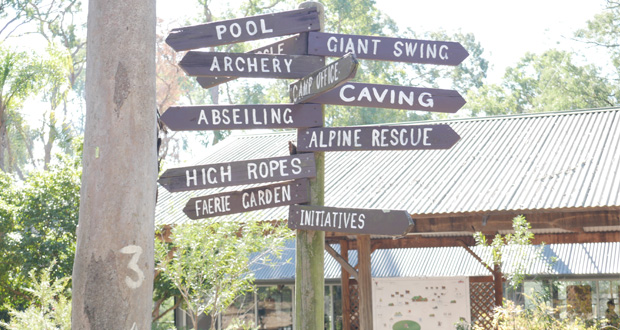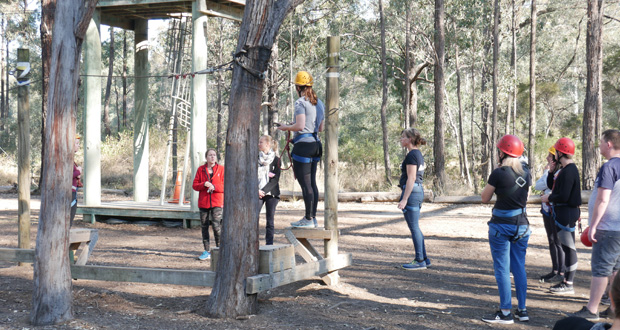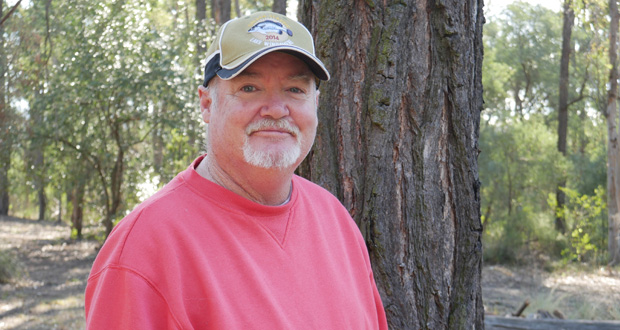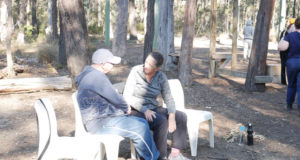Nursing Review spent a day at Recovery Camp, a joint program for health students on clinical placement and people with lived experience of mental illness.
I put my left foot in and take it back out. I put my left foot back in, as told, and out again a couple of more times. I then find myself shaking it all about.
All of this is occurring on a cheek-numbing but sunny winter Thursday morning. Normally I would be ensconced safely in the warmth of a stuffy Surry Hills office, but today I am out bush (says the city boy), in a circle of strangers, doing the hokey-pokey.
I then find myself heaving a non-existent watermelon into the air.
I’m instructed to chop it up and like a poor-man’s Daniel-san I do, slowly carving my karate hand through the air.
All of this is part of our morning warm up before a full day of group activities at Recovery Camp.
I’ve driven 70-odd kilometres west of Sydney this morning to Yarramundi, a suburb flanked by the Nepean river on one side and the Blue Mountains on the other. It's technically Sydney, but has a country town feel to it
I almost didn’t notice my serene surroundings as I sped along the motorway blasting some early 2000s indie music, until suddenly I start to feel more relaxed. As I take the last exit, buildings fall away and clear pale blue sky now fills my eyeline. The car starts to weave and wind along the now tight roads, across the river as trees emerge either side of me.
I pull into the YMCA for a day at Recovery Camp, an award-winning program that has been changing lives since 2013.
For one week several times a year, the camp brings nursing students on placement, together with people living with a mental illness. It’s a joint educational and wellness experience. The campers abseil, climb, do team exercises, karaoke and quizzes, live together and eat together, but above all they try to break down the stigma that surrounds mental health.
And by the end of the day I will have seen and heard first-hand what makes a good mental health nurse.
“I get involved so they see I’m not some airy fairy academic. I’m on their level, I still practice.”
Kate McGregor stands next to me, chopping watermelons too, both slightly embarrassed. Kate, an RN and mental health nurse, is one of the facilitators here.
“I get involved so they see I’m not some airy fairy academic. I’m on their level, I still practice,” she tells me in her soft Mancunian accent, just recognisable despite her 30 years in Australia.
Kate, along with professor Lorna Moxham and Bridget Hayes, are the clinical facilitators from the University of Wollongong. They use the week as a practical, if intense, way of teaching aspirant nurses how to be good mental health clinicians.
The consumers (the term patient is avoided in mental health I’m told) are here voluntarily. The conditions that the group face range from Schizophrenia and depression to borderline personality disorders and complex trauma.
The interesting thing is that as I stand in the circle – by this point turning into a line as our next task is to get in order of age without speaking, a communication exercise we are later told – I can’t tell who are the consumers and who are the students. Everyone is happy, mingling, at ease with each other.
I can make a guess. Like the two older guys sitting off to the side, watching on, not taking part.
Kate tells me that one of the men, Stephen, didn’t take his meds before bed and had a tough night, so he’s tired.
The other man is Andy, sitting with one leg up on a chair because of injury, even then you can tell that he is a large figure, tall and broad. I’m told he is the man to talk to about Recovery Camp, he is spoken about with reverence by other consumers, “he is our rock, he always knows the right thing to say,” someone tells me. He is their unofficial spokesman.
Andy, 55, is on his 13th stay at Recovery Camp. Formerly a nurse and later a disability services worker, he was diagnosed with bipolar at age 45.
Bipolar type two to be exact, which is “rapid cycling”. He can go from being “pretty normal” to quite manic in a quick period of time he says and generally drop down from these fleeting highs to a depression that can last weeks.
Looking back on his life he believes that he has been bipolar since his early 20s, but it went undiagnosed or sometimes misdiagnosed as depression. He spent lots of that youth filling his manic hours with fast cars, fast motor bikes, drugs and alcohol, promiscuity, you name it.
One turning point in his life was the manic episode he suffered in front of his psychiatrist, who was then able to diagnose and treat him accordingly.
The other was finding Recovery Camp. He heard about it after a particularly tricky stay in hospital.
“I haven’t had an admission [to hospital] since I’ve been coming to Recovery Camp,” he tells me over a cuppa.
“Bad years I had five, maybe six and that’s three weeks a pop, some of those were five weeks stints.”
And that includes three or four weeks either side of the hospital stay which were “a bit dodgy” while he was still recovering. He tells me that he can’t be sure if it is camp that is the reason he is doing so well, but he isn’t going to tempt fate by not coming either.
The research Moxham and her team have done suggests that camp is the reason Andy is doing so well.
They’ve found that those who attend camp show 67 per cent less hospital admissions than a control population. Those who do end up in hospital have 38 per cent reduction in length of stay.
“My psych thinks this is the best thing that has ever happened. My wife gets a week respite as well. She knows where I am, she knows I’m safe. She knows the food's pretty good and she knows I’m surrounded by nurses and professionals,” he says.
Sitting across from Andy he cuts a relaxed figure in his cap and faded red jumper and trackies. He is the definition of the hidden nature of mental illness; I would never know. Our conversation veers away from camp at times, to our shared enjoyment of golf to family life and travel.
But we always come back to how he treats camp now; his recovery is secondary to what he sees as a teaching role.
“I come for a number of reasons. One of the main reasons is to educate the nurses,” he tells me. “I love giving back, because when I’m unwell, I take a lot from the nurses, they have to work pretty hard around me.”
Throughout the day I’ve heard Andy call out to students as he passes, “you thought of any questions yet?” He wants them to ask “the hard questions” so they can learn. Like the “Three S’s” he says, “there you go, what are they?” he quizzes me. I feel awkward guessing.
Suicide, sex and self-harm, is his answer.
Nursing student Vanessa has been on the end of this ‘teaching’ experience.
“The first consumer brought it up without me asking, I wasn’t prepared for it, it was hard, and I did go to bed that night and it did feel really heavy. But the next day I was prepared and I asked the question,” she says.
She has enjoyed the week, even the tough conversations, and likes the contrast to placements she has had in hospitals.
“It’s very different because you don’t just walk away, you have time to sit and chat, you have meals with them. You don’t get that time on the ward.”
Another student, Sarvinder, has had a clinical placement on a mental health ward and tells me that she believes the “holistic approach” camp takes is beneficial for both students and consumers.
“Here you are connecting with a person, creating a therapeutic relationship,” she tells me over our chilli con carne lunch, well earned after our running around this morning.
“Wards can be very routine, very regimented,” whereas “here boundaries are blurred,” she says. “They are living, breathing textbooks,” Vanessa chimes in.
We break from our lunch after a healthy serving of birthday cake and a typically out of tune rendition of happy birthday aimed at a consumer, Alana, who has turned 21.
We gather around the fire for a debrief of the mornings activities before we head out into the wild again. The consumers seem most comfortable here and they’ve told me the best therapy often happens around the fire, telling “war” stories. They like to try and shock the nurses.
I’m waiting on Lorna who has promised me five minutes to chat, but out of the corner of my eye I notice she and two students are down on their haunches in front of Steven, listening intently wearing looks of soft concern.
Lorna and Stephen then disappear. Lorna returns alone and tells me, rather mater-of-factly, that Stephen is having a psychotic episode, I’m taken aback. This is the first time today that mental illness has felt real to me. Up until now it has all been fun and games in the outdoors.
“He is having visual hallucinations and auditory hallucinations,” she says. “When he sees our faces, he said you look like robots, you look like tin people, your faces are distorted and its really scary and you're all talking like robots and you’re all speaking really quickly.”
Lorna the clinician kicks in, as well as facilitating the learning of the 35 nursing students present, Lorna and her colleagues are responsible for the health of the 32 consumers for the week. At other camps, those numbers can be in the hundreds.
“I worked through the usual stuff. I told him he was safe, validated. I told him I didn’t see [the hallucinations] but I understood he did.”
She rattles off another few steps, including a medication that Steven takes to quell the hallucinations.
“When I’m working as a clinician in this setting, I always take a student with me. Everything is a learning opportunity,” she says.
“Always taking students aside, explaining why we are making these decisions … it’s a really different experience for facilitators as well also looking after 10 people’s mental health.”
We walk together to the next activity for the day, an obstacle course called the high ropes. This activity is about trust, teamwork and overcoming fears.
As the group get their safety briefing, Lorna and I sit down amongst the tress next to Stephen who is quiet, small and hidden behind the peak of his baseball cap.
Lorna’s clinical check-in seamlessly turns into a casual conversation between the two: quiet, intimate. Stephen slowly opens up as the medication and Lorna’s care take effect, working in tandem.
“I’m being silly,” I hear Stephen whisper to Lorna. She whispers something back that I don’t catch. They laugh and then embrace each other.
He slowly acknowledges my presence and I join the conversation. He tells me how glad he is that the episode happened here. If he had been at home, he would have been sent to hospital, sedated and potentially left in a psychotic state for 24 hours or so. Nurses and doctors are often too busy he says.
He also likes the camp as he doesn’t feel judged the way he does in the community.
“You know who has changed those attitudes,” Lorna interjects and points at him. “You are shaping the future of nursing practice.”
“Thank you, that’s a nice feeling,” he says. He seems physically larger now, a different person.
Within the space of an hour I have seen Stephen come back from extreme anguish. He is now sat next to a first-time camper who, through tears, tells him about her NDIS problems. He lives near her and they’ve bonded over this shared postcode. He is coaching her on the best ways to get help in the community.
In this moment, the impact of the camp, this intense therapeutic experiment feels immense.
“You feel like you are going to explode, and self-harm is the release.”
Lorna, Kate and Bridget are passionate about this project. That is a fairly cliched and oft used description of a clinician who likes what they do, but it’s the word that comes to my mind most through the day.
Lorna and I watch on as the consumers and students navigate the high ropes, we watch as Rod, who has made it halfway around the course, suddenly gets stuck and can’t move. The whole team participate in the ‘rescue’. She looks proud, cheering on now and then, telling me how important it is to build him up.
I ask whether this project has any government engagement or funding given the obvious benefits and potential savings it could have for the health system.
There is anger and frustration in her reply.
Conversations have occurred and politicians show interest, but every time she comes back to them, they move the goal posts. Funding could help so many she says. This is a sentiment echoed throughout the camp.
Snapping out of her frustration momentarily, she sees the bright side. She’s coming towards the end of her academic career, so she is just happy to do some good she says.
As we are watching Rod – who has a dual diagnosis of schizophrenia and OCD – Lorna thinks of his parents who care for him. They are so pleased when he can come to camp she tells me, they get some respite. Not to do anything special, just the break is nice. She puts her head in her hands as frustration creeps in again. She feels so strongly for the consumers and their families. As I listen, the sting of tears coming to my eyes hits me so quick that I turn my head from her involuntarily. Luckily, we’re standing side by side looking at the obstacle course, I’m sure she didn’t notice.
“I have to check my recorder,” or some other lie I say, to get away for a moment.
At several points, the weight of the day creeps up on me. These times are sudden and come out of nowhere, and the reason I am here, the detached observer, goes out the window.
It happens again later during the sharing activity towards the end of the day. The question is "what makes a good mental health nurse?” All the consumers take turns sharing as the students listen on.
Alana talks about her experiences with mental health nurses; she “was raised by nurses from age 14 to 17”. She has borderline personality disorder and self-harmed in the past. “You feel like you are going to explode, and self-harm is the release,” she explains to the group.
She says the best nurses she encounters don’t judge her. They are not selfish and are calm. They try to be nice and, very simply, they are interested and ask questions. The other consumers nod in agreement.
Alana has that youthful energy and a large, bright smile. She could be one of the students.
This could be me, I think to myself as the sting comes back to my eyes. The pain of mental health is hard to listen to. You need empathy.
This week the students have learned that first-hand and no matter where they end up, they will be better nurses for that lesson.
“Take it back with you girls,” Kate says in between shares, urging the students to soak up the experience. “Take it back.”
For more information on Recovery camp please visit recoverycamp.com.au
Do you have an idea for a story?Email [email protected]
 Nursing Review The latest in heathcare news for nurses
Nursing Review The latest in heathcare news for nurses






Congratulations Lorna Moxham
Sounds so wonderful, how lucky to have health professionals so dedicated to making a difference